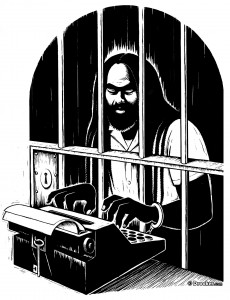A Faustian Bargain: Mumia Abu Jamal and Life Without Parole…
Yesterday came the news that the prosecution has decided to drop the death penalty against Mumia Abu Jamal. For many who have been working on his case for decades, I know that there is a mixture of relief mingled with sadness. After all, he will now have to spend life in prison without the possibility of parole. In my opinion, this is still a capital sentence and the state has once again prevailed in sanctioning death.
I am not an expert in Mumia Abu Jamal’s case. From the limited amount that I do know, there seems to be reasonable doubt about his guilt. My purpose here is not to litigate the facts of his case. Instead, I want to suggest that the sentence of life without the possibility of parole is more insidious than and as detrimental as capital punishment. This may strike some readers as an absurd assertion but bear with me as I explain my rationale.
The following is a paragraph from a Washington Post article about the prosecution’s decision in the Abu Jamal case:
While the decision follows decades of protests and public appeals, Wednesday’s decision appears not to be a result of activist or lawyer action. Instead, the widow of slain officer Daniel Faulkner has reportedly persuaded prosecutors to stop pushing for the death penalty, saying she was tired of the constant reminders of her husband’s death.
So in order to move on with her life, Ms. Faulkner convinced prosecutors to drop the death penalty against Mumia Abu Jamal. The Post article provides more context for her decision:
Maureen Faulkner waited nearly 30 years for her husband’s murderer to be executed. But following a seemingly endless cycle of legal appeals, she said she realized it would never happen.
On Wednesday, Faulkner gave her blessing to the decision by Philadelphia District Attorney Seth Williams to stop pursuing the death penalty for Mumia Abu-Jamal, whose claim that he was the victim of a racist legal system made him an international cause celebre.
“My family and I have endured a three-decade ordeal at the hands of Mumia Abu-Jamal, his attorneys and his supporters, who in many cases never even took the time to educate themselves about the case before lending their names, giving their support and advocating for his freedom,” Maureen Faulkner said. “All of this has taken an unimaginable physical, emotional and financial toll on each of us.”
Essentially after 30 years of legal challenges, Ms. Faulkner became convinced that Abu Jamal would never be executed so she has seemingly reconciled herself to the fact that he would instead spend the rest of his life in prison. I have the deepest sympathy for this woman who lost her husband to an unspeakable act of violence. It is awful. Full stop.
I often hear friends of mine who oppose the death penalty argue that prisoners “would suffer more” if they had to spend the rest of their days locked in cells. This argument is used as a way to entice people to support the abolishment of the death penalty which is described as barbaric, capricious, and unjust. The truth is that for me, it is more barbaric to cage people until they die in prison. This is usually an excruciatingly slow and soul-killing way to die. Life without parole is, in my opinion, a de facto death sentence. What is the practical difference between being executed in prison and being condemned to spending the rest of your days in a cage? It appears that Mrs. Faulkner has come to the ultimate decision (after all of these years) that life in prison is basically as good as a death sentence. It has the added benefit of keeping the case out of the headlines for the foreseable future.
In countless cases (less publicized than Abu Jamal’s), prisoners who are sentenced to life without parole do not have international campaigns launched on their behalf. I venture to say that if Mumia Abu Jamal had been sentenced to life without parole in the first place as opposed to death, he might not have gained the international notoriety that he has. Being spared from state-sanctioned murder has a way of diminishing the fervor of crusaders and activists. Usually those sentenced to life without parole (even unjustly) will be forgotten as they are relegated to the unseen caverns of our prisons. Therein lies the horror.

